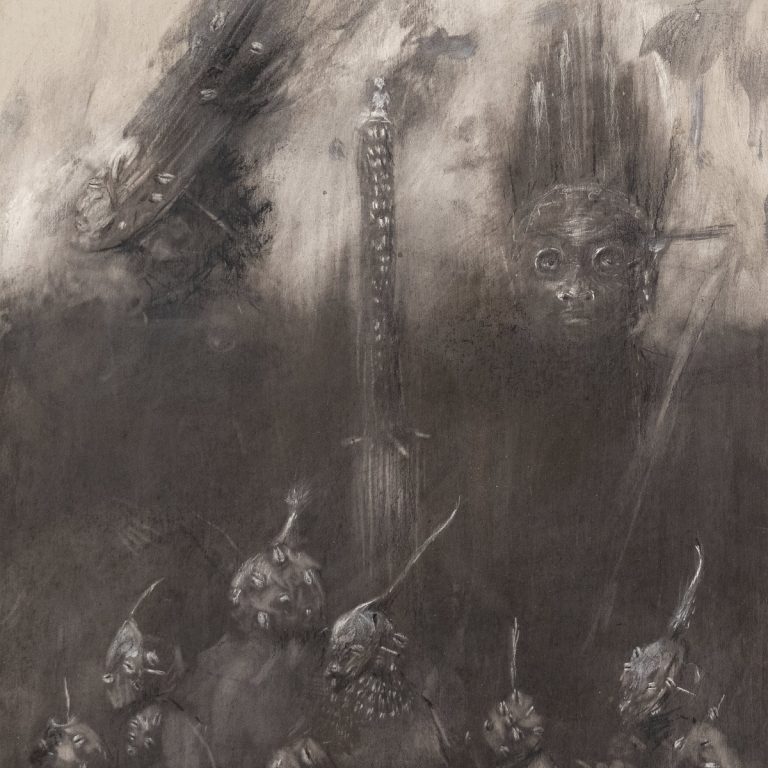Moor Mother’s new album The Great Bailout is Camea Ayewa’s most confrontive project, as she mostly backburners literary constructs, instead forging an almost essayistic and unwaveringly polemical set. Throughout the sequence, Ayewa offers a paralyzing timeline, enumerating the Western world’s crimes against Black lives and spirits. Rendering a vivid account of injustice, exploitation, and horror, she points to the causes and conditions of intergenerational trauma, how the plight of Black people over the centuries has been passed on socially, environmentally, and biologically. The past remains agonizingly relevant, and ongoingly corrosive, especially as no serious steps have been taken to rectify what occurred or extend appropriate restitution (whether that be financial or in the form of governmental apologies).
Opener “Guilty” features what may be Lonnie Holley’s most heartrending vocal performance. “For years … / we watched the slave ships being unloaded”, Holley moans. “Did you pay off the trauma?” Ayewa interjects, her voice superimposed over Holley’s and a mix of synthy strings. The track recapitulates a career-long stance, Ayewa aligned, at least thematically, with such writers as Audre Lorde, James Baldwin, Nikki Giovanni, and Ta-Nehisi Coates, as well as hip-hop figures from Public Enemy to Little Simz to Kendrick Lamar.
That said, Ayewa’s topical bents are no less vital for being grounded in a familiar lineage. Additionally, her tone on Bailout indicates an innovative sense of restraint. Ayewa accesses a newfound intensity based, paradoxically, on her ability to sustain a relatively objective relationship to her content. Bailout is a far cry from the self-mythologizing first-person perspectives shared on Ayewa’s debut, 2016’s Fetish Bones, or the languid narratives of 2020’s BRASS, her collaboration with billy woods.
“All the Money”, for example, shows Ayewa operating almost as a tour guide or usher. Instrumentally, she makes use of electronic and rhythmic non sequiturs that could’ve been plucked from a Backxwash mix or a John Carpenter horror track. “1780 Saint Paul’s Cathedral / 1857 Victoria and Albert’s Museum / 1858 Big Ben,” Ayewa sneers, then asking, “Where’d they get all the money? The money the money”. Alya Al-Sultani contributes ethereal back-up vocals, conjuring the ghosts of the dead, masses of people subjugated and forced into enslavement.
“God Save the Queen” is an acerbic recasting of the famous anthem. “Let her word be spread throughout the land”, Ayewa snarls, decrying the toxic effects of colonialism. A wandering trumpet recalls 2022’s Jazz Codes, evoking the primacy of Black music. “Death by Longitude”, meanwhile, fluctuates between noisy sprawls and austere yet agitative sonics. “What do we say of Barbados? / What do we say of Jamaica? / Europe is God / and everything else is the devil”, Ayewa proclaims, again referencing the abominations of colonialism. Drawing from the meta-bearings and philosophic macro-views of 2021’s Black Encyclopedia of the Air, Ayewa implicitly alludes to the Anglicanizing of Christ, the transmogrification of a dark-skinned prophet into a white-skinned messiah.
With “Liverpool Wins”, Ayewa addresses the Black experience pre and post the UK’s 1833 Slavery Abolition Act. While the history surrounding this milestone is complicated, it’s clear that that the legislation in the UK (which included compensating slave owners) and later the 13th Amendment in the US (which resulted in the American Civil War and eventual compensation of many former enslavers) failed to sufficiently correct the violations inherent to Western hierarchies. Ayewa again points out, her voice accented by noisy flares, that discriminatory practices endured and even proliferated post the abovementioned legislations, though as the late-19th, 20th, and 21st centuries unfolded, these maltreatments became less overt and more institutionally hardwired (if interested, take a look at Michelle Alexander’s The New Jim Crow, Dennis Childs’ Slaves of the State, and Peter Fryer’s Black People in the British Empire, among other books).
The epic “South Sea” opens with a palimpsest of bluesy moans courtesy Sistazz of the Nitty Gritty. The track segues into a mix of truncated breaths and disturbing gasps that could’ve been plucked from Jordan Peele’s Us. The track features startling images of slaves transported on a monstrous ship, Ayewa composing a vision at once dream-like and stunningly palpable. “When the white man declares himself science / he is no longer human”, Ayewa proclaims, noting the way in which whites attempted to place themselves at the front of the evolutionary chain, imagining themselves (consciously and unconsciously) as demigods or supreme beings (one can’t help but ponder Baldwin’s “lie of whiteness”). Instrumentally, as the piece nears completion, jazzy eruptions occur, Ayewa’s voice occasionally cracking.
To what specifically does Ayewa’s title refer? What was and is being bailed out, propped up, perpetuated? Ayewa (as part of a large and loud chorus) might answer: the Western illusions of democracy, equality, and fairness. In this way, The Great Bailout is as much a historical commentary as a work of art, a detailed chronicle of the way in which a flawed system was flawlessly crafted. However, while Ayewa delivers a lengthy list of gut-wrenching atrocities, her purpose is not only to lament the nightmares of slavery and oppression, but to likewise point out, a la The 1619 Project, that Black history is, particularly in the case of the US, Western history. Black contributions are integral to the Western world. Every sphere of Western life is indebted to the Black experience and effort.
Finally, The Great Bailout serves as an implicit celebration of Black creativity, resourcefulness, and indomitability. As Nikole Hannah-Jones writes, “They had their bodies. Histories and bloodlines and drums pulsing in their veins”. Ayewa embraces an austere aesthetic while carrying a bright activistic torch. She casts searing light on the unreconciled, and perhaps unreconcilable, hypocrisies that continue to plague the Western world.


